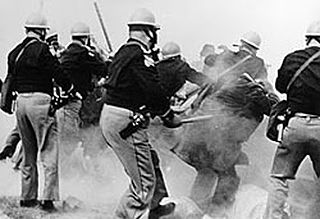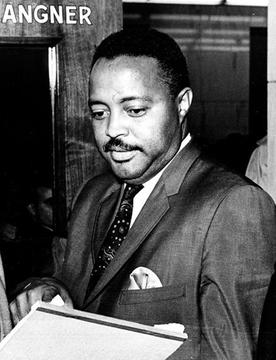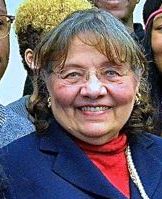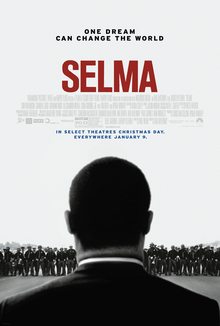
Selma is a city in and the county seat of Dallas County, in the Black Belt region of south central Alabama and extending to the west. Located on the banks of the Alabama River, the city has a population of 17,971 as of the 2020 census. About 80% of the population is African-American.

John Robert Lewis was an American politician and civil rights activist who served in the United States House of Representatives for Georgia's 5th congressional district from 1987 until his death in 2020. He participated in the 1960 Nashville sit-ins, the Freedom Rides, was the chairman of the Student Nonviolent Coordinating Committee (SNCC) from 1963 to 1966, and was one of the "Big Six" leaders of groups who organized the 1963 March on Washington. Fulfilling many key roles in the civil rights movement and its actions to end legalized racial segregation in the United States, in 1965 Lewis led the first of three Selma to Montgomery marches across the Edmund Pettus Bridge where, in an incident which became known as Bloody Sunday, state troopers and police attacked Lewis and the other marchers.

The Selma to Montgomery marches were three protest marches, held in 1965, along the 54-mile (87 km) highway from Selma, Alabama, to the state capital of Montgomery. The marches were organized by nonviolent activists to demonstrate the desire of African-American citizens to exercise their constitutional right to vote, in defiance of segregationist repression; they were part of a broader voting rights movement underway in Selma and throughout the American South. By highlighting racial injustice, they contributed to passage that year of the Voting Rights Act, a landmark federal achievement of the civil rights movement.

Malcolm Boyd was an American Episcopal priest and author. He was active in the Civil Rights Movement as one of the Freedom Riders in 1961 and as a minister. Boyd was also active in the anti-Vietnam War movement. In 1977, Boyd "came out", revealing that he was homosexual and becoming a spokesman for gay rights.

Hosea Lorenzo Williams was an American civil rights leader, activist, ordained minister, businessman, philanthropist, scientist, and politician. He is best known as a trusted member of fellow famed civil rights activist and Nobel Peace Prize winner Martin Luther King Jr.'s inner circle. Under the banner of their flagship organization, the Southern Christian Leadership Conference, King depended on Williams to organize and stir masses of people into nonviolent direct action in myriad protest campaigns they waged against racial, political, economic, and social injustice. King alternately referred to Williams, his chief field lieutenant, as his "bull in a china shop" and his "Castro." Vowing to continue King's work for the poor, Williams is well known in his own right as the founding president of one of the largest social services organizations in North America, Hosea Feed the Hungry and Homeless. His famous motto was "Unbought and Unbossed."

Diane Judith Nash is an American civil rights activist, and a leader and strategist of the student wing of the Civil Rights Movement.

Charles Eugene Fager, known as Chuck Fager, is an American activist, author, editor, publisher and an outspoken and prominent member of the Religious Society of Friends or Quakers. He is known for his work in both the Civil Rights Movement and in the Peace movement. His written works include religious and political essays, humor, adult fiction, and juvenile fiction, and he is best known for his 1974 book Selma 1965: The March That Changed the South, his in-depth history of the 1965 Selma Voting Rights Movement, which led to the passage of the Voting Rights Act.

The Big Six—Martin Luther King Jr., James Farmer, John Lewis, A. Philip Randolph, Roy Wilkins and Whitney Young—were the leaders of six prominent civil rights organizations who were instrumental in the organization of the March on Washington for Jobs and Freedom in 1963, at the height of the Civil Rights Movement in the United States.

David Stephenson Rohde is an American author and investigative journalist, he is the former online news director for The New Yorker and now serves as Senior Executive Editor, National Security, for NBC News. While a reporter for The Christian Science Monitor, he won the Pulitzer Prize for International Reporting in 1996 for his coverage of the Srebrenica massacre. From 2002 until 2005, he was co-chief of The New York Times' South Asia bureau, based in New Delhi, India. He later contributed to the newspaper's team coverage of Afghanistan and Pakistan that received the 2009 Pulitzer Prize for International Reporting and was a finalist in his own right in the category in 2010. He is also a global affairs analyst for CNN.

Cordy Tindell Vivian was an American minister, author, and close friend and lieutenant of Martin Luther King Jr. during the civil rights movement. Vivian resided in Atlanta, Georgia, and founded the C. T. Vivian Leadership Institute, Inc. He was a member of the Alpha Phi Alpha fraternity.

Jack Belden was an American war correspondent who covered the Japanese invasion of China, the Second World War in Europe, and the Chinese Civil War in the late 1940s.
Popular sovereignty is the principle that the leaders of a state and its government are created and sustained by the consent of its people, who are the source of all political legitimacy. Citizens may unite and offer to delegate a portion of their sovereign powers and duties to those who wish to serve as officers of the state, contingent on the officers agreeing to serve according to the will of the people. In the United States, the term has been used to express this concept in constitutional law. It was also used during the 19th century in reference to a proposed solution to the debate over the expansion of slavery in the United States. The proposal would have given the power to determine the legality of slavery to the inhabitants of the territory seeking statehood, rather than to Congress.

Bernard Lafayette, Jr. is an American civil rights activist and organizer, who was a leader in the Civil Rights Movement. He played a leading role in early organizing of the Selma Voting Rights Movement; was a member of the Nashville Student Movement; and worked closely throughout the 1960s movements with groups such as the Student Nonviolent Coordinating Committee (SNCC), the Southern Christian Leadership Conference (SCLC), and the American Friends Service Committee.

John N. Herbers was an American journalist, author, editor, World War II veteran, and Pulitzer Prize finalist.

Selma is a 2014 historical drama film directed by Ava DuVernay and written by Paul Webb. It is based on the 1965 Selma to Montgomery voting rights marches which were initiated and directed by James Bevel and led by Martin Luther King Jr., Hosea Williams, and John Lewis. The film stars actors David Oyelowo as King, Tom Wilkinson as President Lyndon B. Johnson, Tim Roth as George Wallace, Carmen Ejogo as Coretta Scott King, and Common as Bevel.
Richie Jean Sherrod Jackson, was an American author, teacher, and civil rights activist.

Frederick Douglas Reese was an American civil rights activist, educator and minister from Selma, Alabama. Known as a member of Selma's "Courageous Eight", Reese was the president of the Dallas County Voters League (DCVL) when it invited the Southern Christian Leadership Conference and Martin Luther King Jr. to Selma to amplify the city's local voting rights campaign. This campaign eventually gave birth to the Selma to Montgomery marches, which later led to the passage of the Voting Rights Act.

On March 7, 2015, President of the United States Barack Obama delivered a speech at Edmund Pettus Bridge to mark the 50th anniversary of the Selma to Montgomery marches on the subject of race relations within the United States. Among the estimated 40,000 present were former President George W. Bush, former First Lady Laura Bush, and Amelia Boynton Robinson, John Lewis, Diane Nash, Bernard Lafayette, and many other 'foot soldiers' who had taken part in the march in 1965.
James Albert Hare Jr. was a politician from the U.S. state of Alabama and a veteran of the United States Army during World War II. He served as an assistant state Attorney General, a county solicitor, a member of the Alabama House of Representatives, and an Alabama circuit court judge. He was an active defender of Jim Crow segregation as a judge.
Robert "Bob" Mants, Jr. was an American civil rights activist, serving as a field secretary for the Student Nonviolent Coordinating Committee (SNCC). Mants moved to Lowndes County, working for civil rights for the remainder of his life. Lowndes County contained the majority of the distance covered by the 1965 Selma to Montgomery march, and was then notorious for its racist violence.















